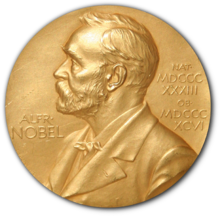Nobel Week Dialogue
| The Nobel Prize | |
|---|---|
 |
|
| Awarded for | Outstanding contributions for humanity in chemistry, literature, peace, physics, or physiology or medicine. Often confused with Nobel Memorial Prize in Economic Sciences. |
| Country |
|
| Presented by |
|
| Reward(s) | Prize money of 9 million SEK – Just over $1 million USD (2017), a medal (sold for up to $4.76 million USD) and a diploma. |
| First awarded |
|
| Number of laureates | 584 prizes to 923 laureates as of 2017[update] |
| Website | nobelprize |
The Nobel Prize (/ˈnoʊbɛl/, Swedish pronunciation: [nʊˈbɛl]; Swedish definite form, singular: Nobelpriset; Norwegian: Nobelprisen) is a set of annual international awards bestowed in several categories by Swedish and Norwegian institutions in recognition of academic, cultural, or scientific advances.
The will of the Swedish scientist Alfred Nobel established the prizes in 1895. The prizes in Chemistry, Literature, Peace, Physics and Physiology or Medicine were first awarded in 1901. In 1968, Sveriges Riksbank (Sweden's central bank) established the Sveriges Riksbank Prize in Economic Sciences in Memory of Alfred Nobel, which has been commonly known as the Nobel Prize in Economics. The Nobel Prize is widely regarded as the most prestigious award available in the fields of literature, medicine, physics, peace, chemistry and economics.
The Royal Swedish Academy of Sciences awards the Nobel Prize in Physics, the Nobel Prize in Chemistry, and the Sveriges Riksbank Prize in Economic Sciences in Memory of Alfred Nobel; the Nobel Assembly at Karolinska Institutet awards the Nobel Prize in Physiology or Medicine; the Swedish Academy grants the Nobel Prize in Literature; and the Nobel Peace Prize is awarded not by a Swedish organisation but by the Norwegian Nobel Committee.
...
Wikipedia
